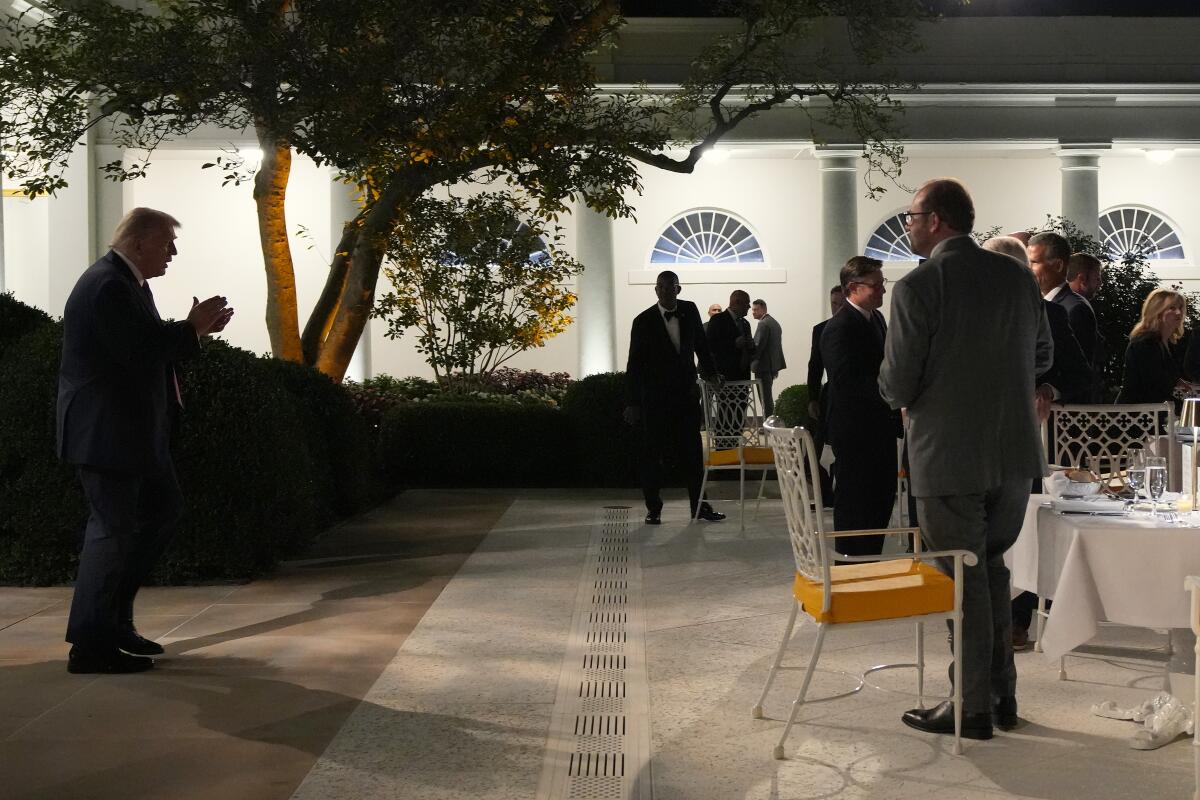World
Trump’s Second Term: Government Power as a Personal Tool

President Donald Trump has significantly expanded the use of presidential power during his second term, utilizing government resources to advance personal and political interests. This strategy has been characterized by actions aimed at various targets, including universities, media organizations, and individuals he perceives as adversaries. As he marks seven months in office, Trump’s approach raises questions about the implications for governance and political accountability.
Exerting Control Over Federal Agencies
From the outset of his term, Trump has actively engaged the federal government to serve his agenda. His administration has implemented a series of actions that reflect a determination to exert control over law enforcement and regulatory bodies. Recently, hundreds of federal agents and National Guard troops were deployed across Washington, D.C., following Trump’s invocation of a seldom-used law allowing presidential control over local law enforcement.
This deployment is part of a broader strategy threatening similar actions in cities controlled by Democratic leadership, including New Orleans, Chicago, and New York. Furthermore, Trump has pursued efforts to dismiss a Federal Reserve governor based on unverified allegations of mortgage fraud.
Trump’s administration has targeted institutions and individuals with a range of controversial actions, such as:
- Threatening to block a stadium plan for the Washington Commanders football team unless it reverted to its former racially charged name.
- Revoking security clearances for attorneys at law firms he disapproves of.
- Cutting funding for federal research initiatives and attempting to restrict international students at elite universities.
Under pressure, institutions like Columbia University settled for $220 million, while the University of Pennsylvania retracted records related to transgender swimmer Lia Thomas. These examples illustrate the significant influence Trump wields over educational and legal institutions.
The Politics of Power
Trump’s administration has also seen the dismissal or reassignment of federal employees involved in cases concerning him. In a notable instance, he dropped corruption charges against New York Mayor Eric Adams to facilitate cooperation in immigration policy matters. Additionally, Trump has pursued settlements against media outlets in lawsuits that many observers deemed weak.
According to Pam Bondi, the Attorney General, the administration is exploring the origins of the Trump-Russia investigation, including appointing a special prosecutor to investigate Letitia James and Adam Schiff, both of whom have been vocal critics.
In response to criticism of his tactics, White House spokesperson Harrison Fields claimed that the actions represent a necessary exertion of power, asserting that the current administration is fulfilling the mandate of the American people.
Trump’s governance style diverges sharply from traditional norms, as he has actively sought to shape public discourse and direct government actions toward personal and political ends. This dynamic reflects a broader trend of leveraging state power to influence the cultural landscape, a strategy that his supporters appear to endorse enthusiastically.
Trump’s second term is characterized by a palpable tension between the exercise of executive power and the constraints traditionally imposed by the Constitution and legal precedents. As he navigates his presidency, the implications of his approach for democratic governance and institutional integrity remain a topic of intense debate.
Throughout his political career, Trump has portrayed himself as a victim of a “weaponized” government apparatus. His rhetoric has evolved into a call to harness this power for his own ends. In a statement made on August 4, 2023, he declared, “IF YOU GO AFTER ME, I’M COMING AFTER YOU!” This sentiment encapsulates his strategy of using governmental authority in a manner that blurs the lines between policy and personal vendetta.
As Trump continues to consolidate power and redefine the role of the presidency, the long-term effects of his actions on U.S. governance and the principles of accountability and transparency are yet to be fully realized. The landscape of American politics is shifting, and the role of the executive branch is being reexamined in light of these developments.
-

 Lifestyle3 months ago
Lifestyle3 months agoLibraries Challenge Rising E-Book Costs Amid Growing Demand
-

 Sports3 months ago
Sports3 months agoTyreek Hill Responds to Tua Tagovailoa’s Comments on Team Dynamics
-

 Sports3 months ago
Sports3 months agoLiverpool Secures Agreement to Sign Young Striker Will Wright
-

 Lifestyle3 months ago
Lifestyle3 months agoSave Your Split Tomatoes: Expert Tips for Gardeners
-

 Lifestyle3 months ago
Lifestyle3 months agoPrincess Beatrice’s Daughter Athena Joins Siblings at London Parade
-

 World3 months ago
World3 months agoWinter Storms Lash New South Wales with Snow, Flood Risks
-

 Science3 months ago
Science3 months agoTrump Administration Moves to Repeal Key Climate Regulation
-

 Science2 months ago
Science2 months agoSan Francisco Hosts Unique Contest to Identify “Performative Males”
-

 Business3 months ago
Business3 months agoSoFi Technologies Shares Slip 2% Following Insider Stock Sale
-

 Science3 months ago
Science3 months agoNew Tool Reveals Link Between Horse Coat Condition and Parasites
-

 Sports3 months ago
Sports3 months agoElon Musk Sculpture Travels From Utah to Yosemite National Park
-

 Science3 months ago
Science3 months agoNew Study Confirms Humans Transported Stonehenge Bluestones









